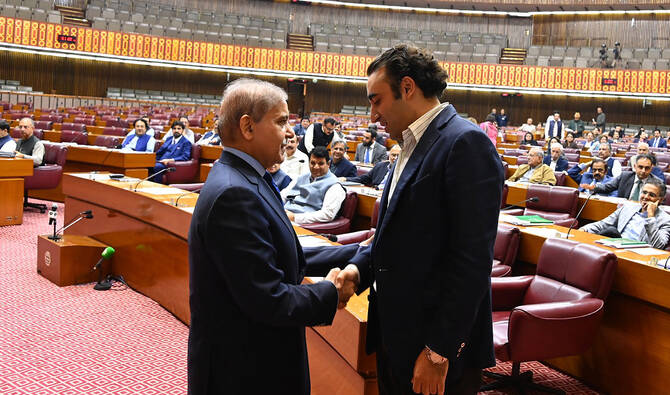ISLAMABAD: Former prime minister Imran Khan’s Pakistan Tehreek-e-Insaf (PTI) party announced on Wednesday it would hold a nationwide movement against the government after the Islamic month of Muharram, days after Pakistan’s top court denied the party reserved seats for minorities and women in parliament.
The announcement followed a meeting of the PTI’s parliamentarians in Islamabad. The party’s lawmakers discussed several issues such as the political situation after the Supreme Court’s verdict last week which denied the party reserved seats in parliament, launching a movement to demand the release of Khan and PTI supporters from prison.
The Supreme Court’s constitutional bench on June 27 ruled that former prime minister Imran Khan’s PTI is not entitled to reserved seats in the national and provincial assemblies, upholding an earlier verdict by the Peshawar High Court. The dispute arose after PTI lost its electoral symbol ahead of the February 8 national polls and its candidates contested as independents.
Despite its candidates winning the most general seats, the PTI was denied reserved seats for women and minorities, which are allocated to parties based on proportional representation, by the ECP. The government lost its two-thirds majority in parliament in July 2024 when the top court reversed the ECP’s decision, terming it unconstitutional and ordering the reserved seats to be allocated to PTI. The ECP and the political parties had filed a review petition, which were accepted by the top court last week.
“We [Pakistan Tehreek-e-Insaf] are starting a movement after Muharram,” Ali Amin Gandapur, Khyber Pakhtunkhwa chief minister and a senior PTI leader, told reporters after the party’s meeting.
“This will be a Pakistan-wide movement, god willing. We will protest peacefully, politically, like we always do. We will proceed and take it forward but if they [government] fire bullets, we will plan for that as well.”
The government rejects the PTI’s allegations that the February 2024 polls were rigged, accusing Khan’s party of disrupting its efforts of ensuring the sustainable economic growth.
RULING COALITION GETS TWO-THIRDS MAJORITY
The ECP’s latest notification granting parties other than the PTI reserved seats for women and minorities means the ruling coalition government now has two-thirds majority in parliament. The electoral authority also withdrew its earlier notifications of July 24 and July 29, 2024 on Wednesday, which declared the successful candidates on general seats in the national and provincial assemblies as PTI-returned candidates.
Sixteen reserved seats for women and three for minorities in the National Assembly were allocated to various parties, with the lion’s share going to the ruling Pakistan Muslim League-Nawaz (PML-N), the PTI’s chief rival. The PML-N were allocated 13 seats, while four were allocated to the Pakistan Peoples Party Parliamentarians (PPPP) and two to the Jamiat Ulema-e-Islam Pakistan (JUI-F).

In this file photo, taken and released by Pakistan’s Press Information Department on October 21, 2024, Prime Minister Shehbaz Sharif (left) shakes hands with Bilawal Bhutto-Zardari, key coalition partner and former foreign minister, at the National Assembly in Islamabad. (PID/File)
With this development, the ruling coalition has crossed the two-thirds majority mark, securing 233 seats in the 336-member National Assembly, the lower house of parliament. A political party or a coalition government needs 224 seats to reach the threshold.
As per the notification, 21 reserved seats for women were reinstated in the Khyber Pakhtunkhwa (KP) Assembly, with eight allocated to the JUI-F, six to the PML-N and five to the PPPP. One seat each was also allotted to the PTI Parliamentarians and the Awami National Party (ANP).
Meanwhile, out of the four reserved seats for minorities in KP Assembly, two were given to the JUI-F and one each to the PML-N and the PPPP.
The ECP restored 24 reserved seats for women in the Punjab Assembly, of which the PML-N received 21, while one seat each was allocated to the PPPP, the Istehkam-e-Pakistan Party (IPP) and the Pakistan Muslim League-Quaid (PML-Q).
Additionally, three minority seats were allocated--two to the PML-N and one to the PPPP.
Two reserved seats for women and one for minorities were reinstated in the Sindh Assembly, with two allotted to the PPP and one to the Muttahida Qaumi Movement-Pakistan (MQM-P).
‘GRAVE INJUSTICE’
Political analysts noted the development would further weaken the PTI’s position at the center.
“This move is likely to further undermine democracy in Pakistan and encourage horse-trading, as the ruling coalition may try to woo legislators particularly in KP,” Mazhar Abbas, a political analyst and journalist, told Arab News.
The PTI has a large support base in KP, where it has been emerging as the largest party since the 2013 polls.
Zahid Hussain, another political analyst, said the move has given the ruling coalition government the much-desired two-thirds majority, enabling them to make constitutional changes as per their will.
“The government and [military] establishment appear intent on securing a two-thirds majority to push through legislation and constitutional amendments of their choosing,” he noted.
Ahmed Bilal Mehboob, president of the Islamabad-based think tank Pakistan Institute of Legislative Development and Transparency (PILDAT) said the move would further strengthen the ruling PML-N as it would reduce the party’s reliance on the PPP.
“In National Assembly, PML-N-led coalition has come closer to having a simple majority without the PPP,” Mehboob said.
He added that after securing the reserved seats, the PML-N-led coalition needed only 11 seats to secure a simple majority on its own.
















